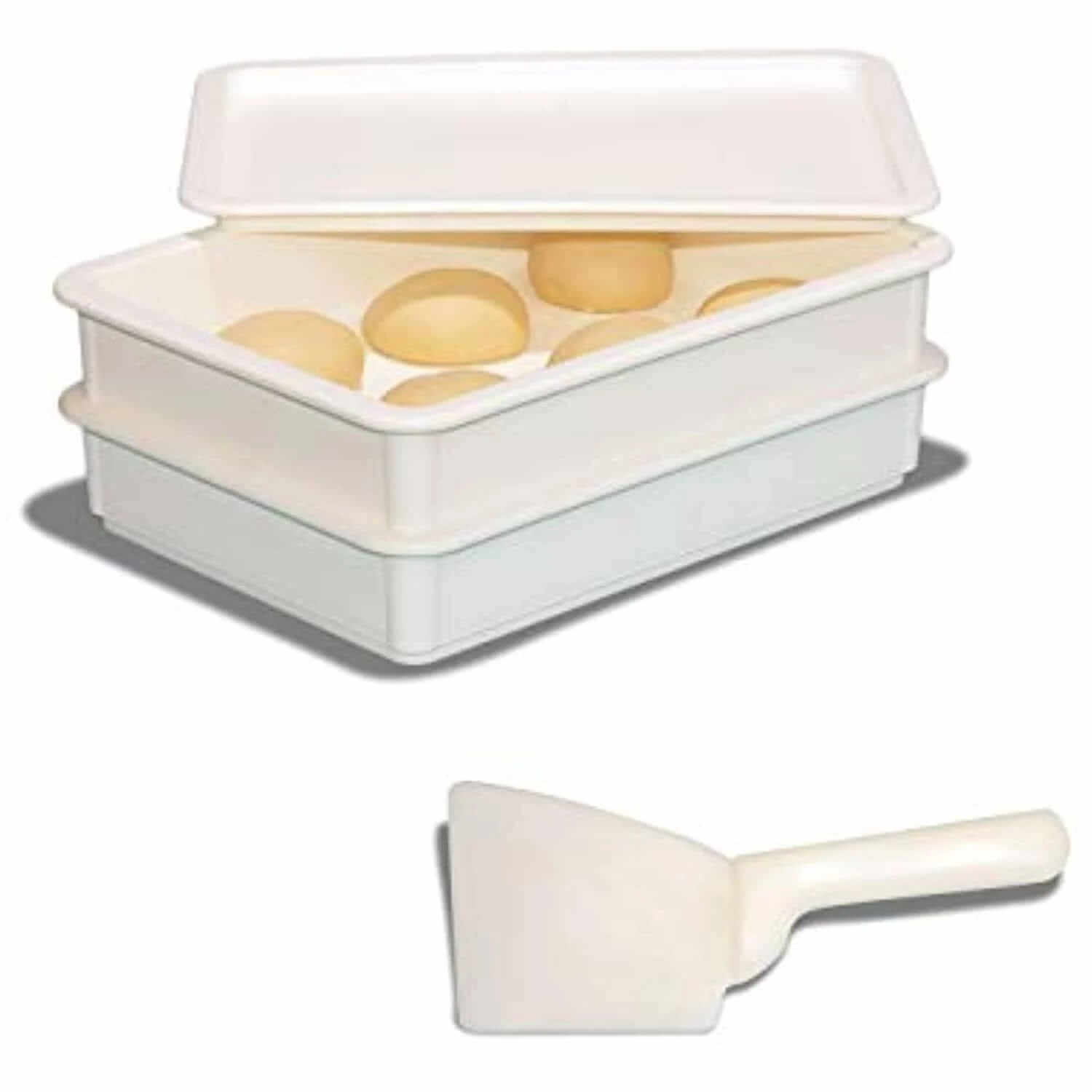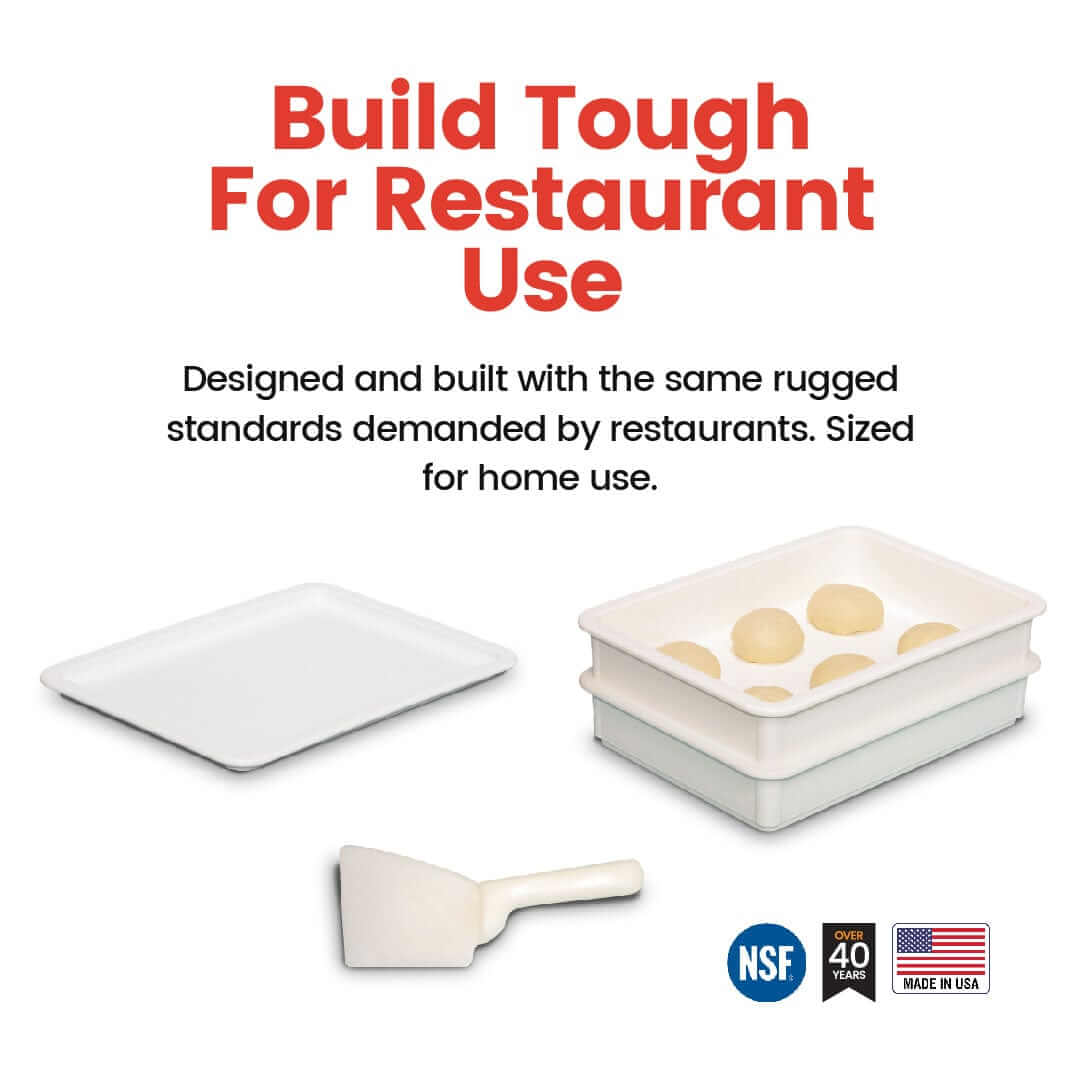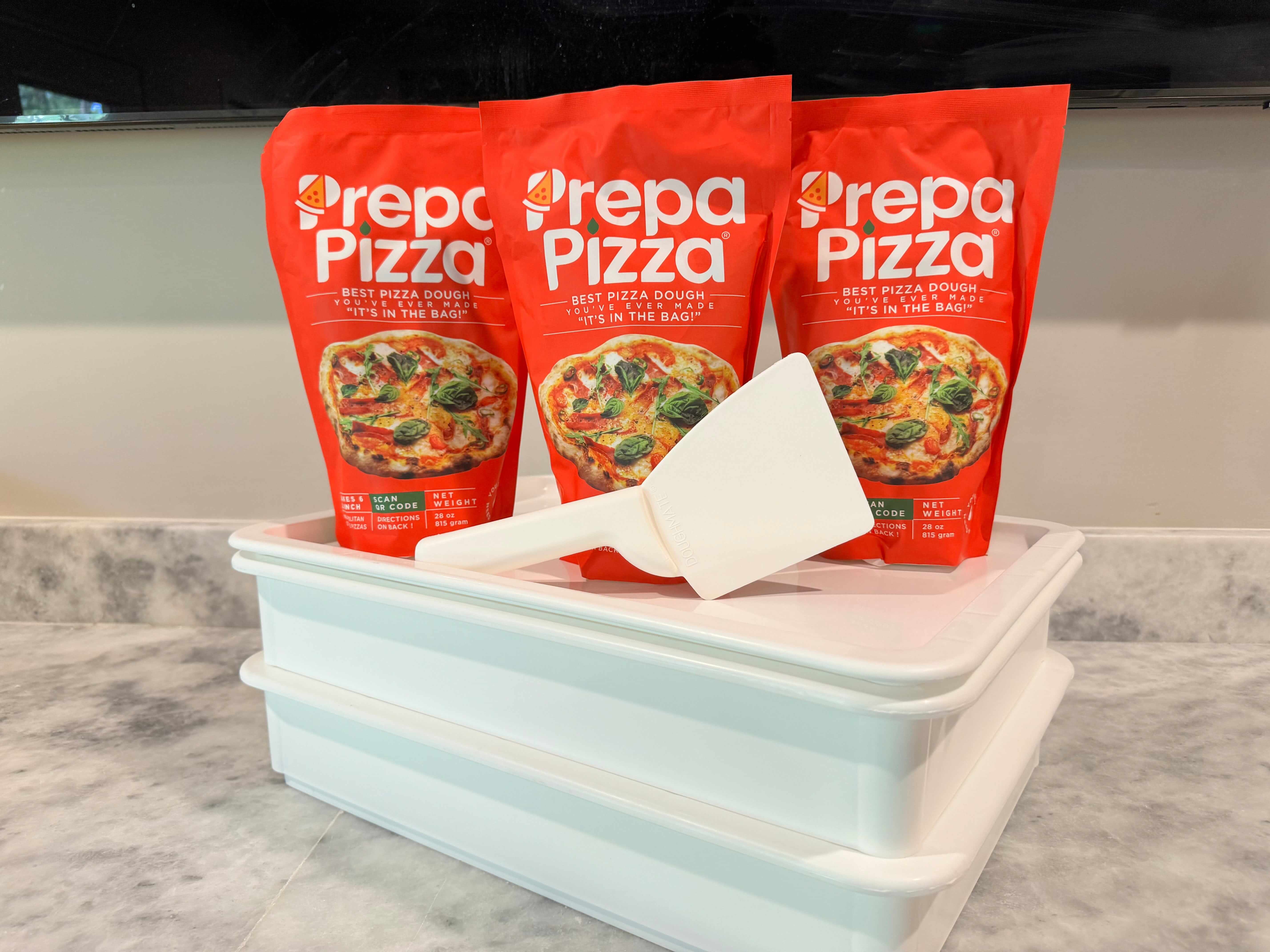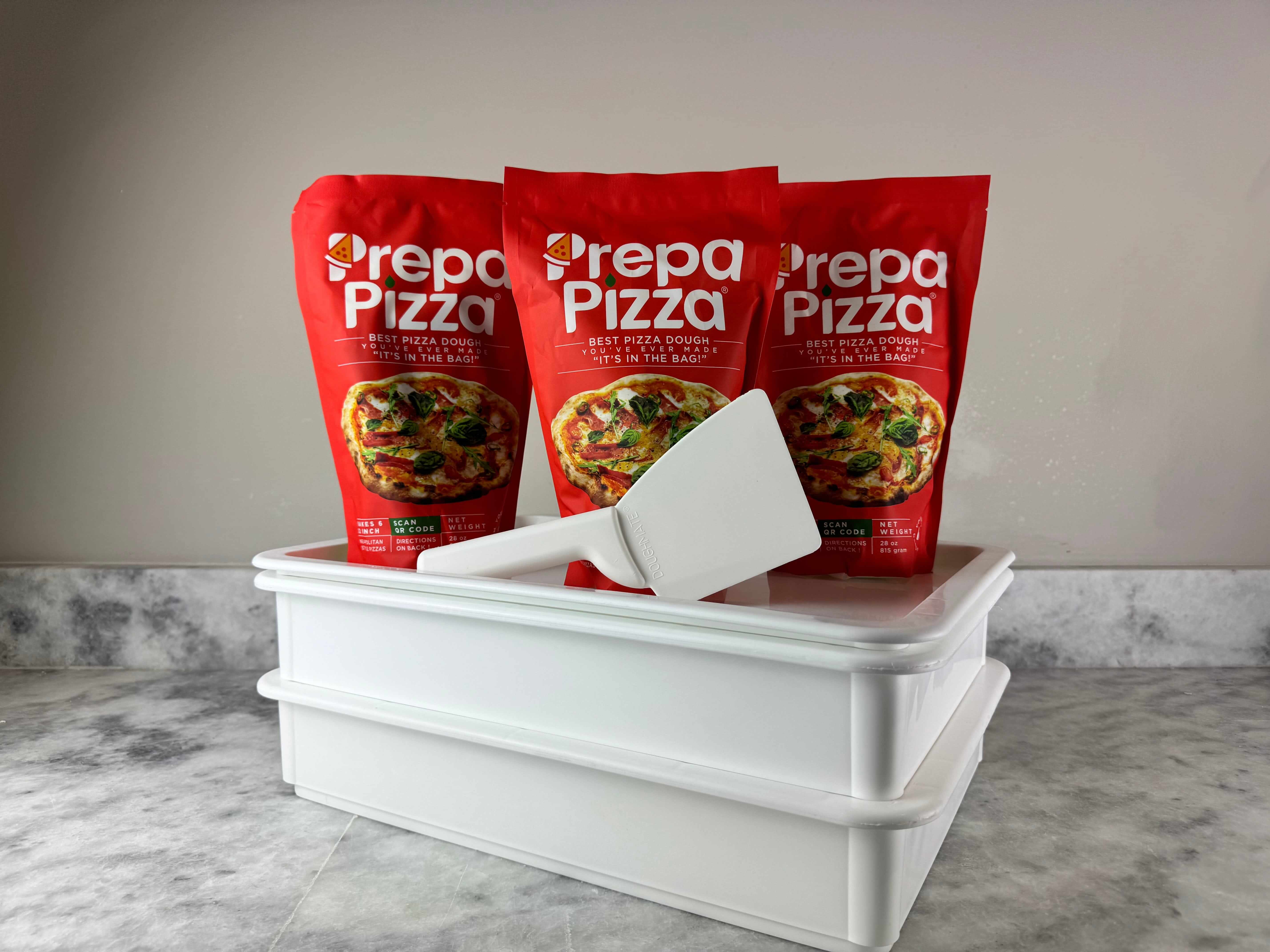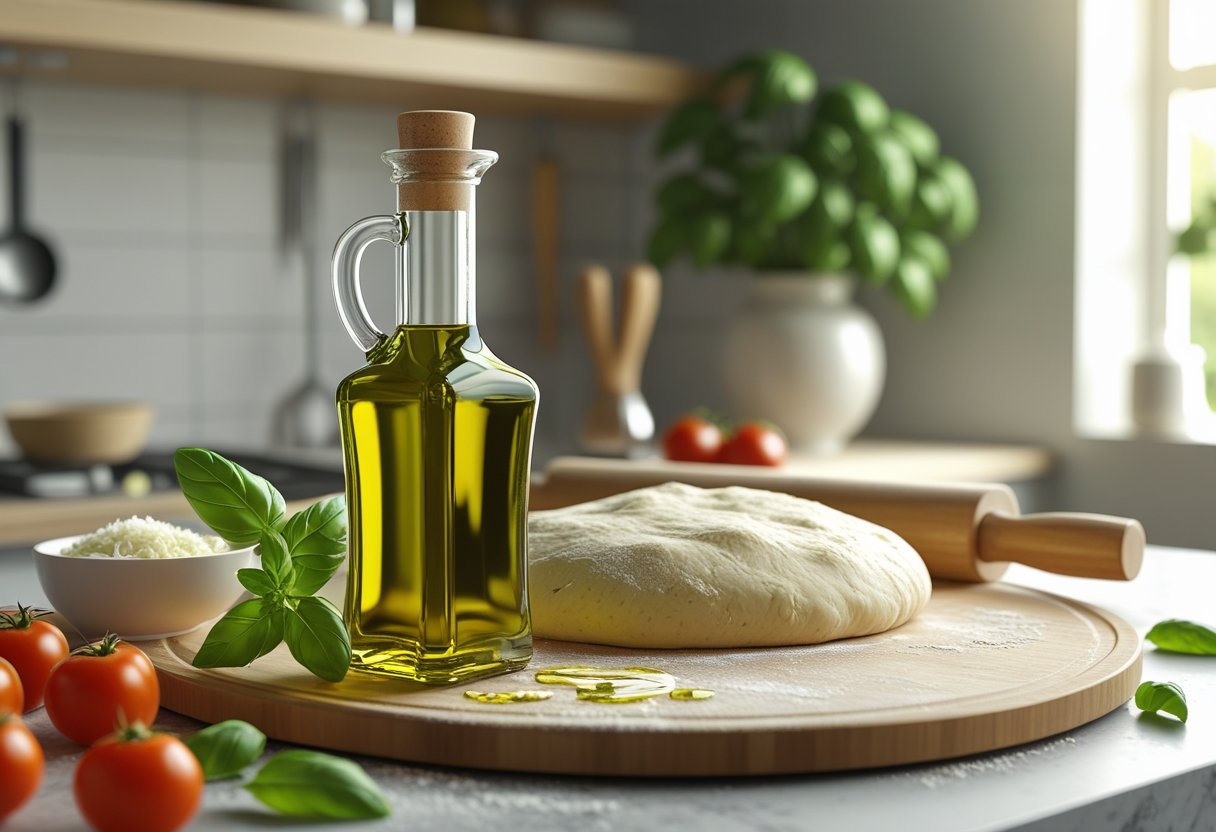
Best Olive Oil to Use with Premade Pizza Dough for Optimal Flavor and Texture
When working with premade pizza dough, choosing the right olive oil can elevate the flavor and texture of your pizza. If you're using Prepa Pizza’s premium premade dough, you want an oil that complements its high-quality ingredients without overpowering the natural taste. Using quality extra virgin olive oil brings out the best in your dough, adding a subtle richness and enhancing the overall experience. You can find Prepa Pizza’s dough kit here to get started.
Extra virgin olive oil is the best choice to pair with your premade pizza dough because it offers fresh flavor while supporting a tender, elastic texture. This oil works well whether you drizzle it on before baking, mix it into the dough, or use it as a finishing touch. Prepa Pizza’s dough, crafted with restaurant-quality ingredients, responds particularly well to EVOO’s balance of taste and baking performance. Find the right oil to match your dough, and you’ll elevate every pizza you make at home.
Why Olive Oil Is Essential for Premade Pizza Dough
Using olive oil with premade pizza dough improves the dough’s handling, flavor, and final texture. When you work with Prepa Pizza’s premium quality premade dough, incorporating olive oil optimizes the crust to achieve restaurant-level results. Olive oil’s impact goes beyond simple lubrication—it transforms how the dough stretches, tastes, and bakes.
You can find Prepa Pizza’s high-quality premade dough here. Adding olive oil to this dough both during preparation and before baking enhances the pizza-making experience.
Role of Olive Oil in Texture and Stretchiness
Olive oil adds a crucial fat content that changes the dough’s texture significantly. It coats the flour proteins, reducing gluten formation just enough to create a dough that remains soft but elastic. This allows you to stretch the dough more easily without tearing or shrinking back.
With Prepa Pizza dough, the presence of olive oil helps maintain pliability, so you can shape the base with minimal resistance. This is particularly important for home preparations where overworking dough can cause toughness. The oil also slows moisture evaporation during baking, helping the crust stay tender inside.
Flavor Enhancement with Olive Oil
Olive oil contributes a subtle, fruity richness that complements both simple and complex pizza toppings. Unlike neutral oils, it adds nuanced depth to the dough itself, making the entire pizza taste more refined.
Using extra virgin olive oil with Prepa Pizza dough maximizes this effect. The oil’s natural antioxidants and mild bitterness balance the dough’s mild yeast flavor, creating a richer bite. This flavor enhancement happens both when olive oil is folded into the dough and brushed lightly on the crust before baking.
Creating a Crispy Crust with Olive Oil
Olive oil influences the crust’s final texture by promoting even browning and encouraging a crisp exterior. When applied to the dough’s surface or incorporated into it, olive oil helps create a thin, crunchy crust while preserving a soft interior.
For best results with Prepa Pizza dough, brushing olive oil on the edge of the crust before baking enhances crispiness where it matters most. The oil’s fat content also interacts with heat to caramelize surface sugars, yielding that desirable golden color and slight snap you expect from a great pizza crust.
Choosing the Best Olive Oil for Pizza Dough
When working with premade dough like Prepa Pizza's premium quality dough kit, the olive oil you select greatly affects flavor, texture, and crust crispiness. The right oil enhances elasticity and gives your pizza that desirable golden crust without overpowering the toppings.
Focusing on olive oil quality, factors such as type, acidity, and origin matter most. Knowing these details helps you pick the best olive oil to use with premade pizza dough for consistent, restaurant-quality results.
What Sets Extra Virgin Olive Oil Apart
Extra virgin olive oil (EVOO) is the top choice for pizza dough because it is made from the first cold-pressing of olives and contains no chemical additives. This process preserves natural antioxidants, polyphenols, and flavor compounds critical for enhancing dough texture and taste.
EVOO’s robust flavor range—from fruity to peppery—adds depth without masking your toppings. It also improves dough softness and crust crispness, qualities you want when finishing Prepa Pizza dough.
Avoid refined or light olive oils, which lack flavor and health benefits. Instead, opt for EVOO labeled as “extra virgin” to ensure you are using genuine, high-quality oil that complements your dough.
Key Factors: Acidity, Origin, and Freshness
The acidity level of olive oil affects taste and quality. The best EVOO for pizza dough has an acidity below 0.8%. Lower acidity signals better quality and a smoother flavor profile.
Origin matters because olives grown in cooler climates like California or Mediterranean regions often yield oil with bright, balanced flavors. Choosing oil from reputable areas ensures consistency.
Freshness is critical as olive oil degrades over time. Look for harvest dates on bottles and use oil within 12-18 months of pressing. Store it away from heat and light to maintain its characteristics.
Recommended Olive Oil Brands for Pizza
When selecting the best olive oil to use with premade pizza dough, choose brands known for consistent quality and flavor. While Prepa Pizza supplies top-tier dough, pairing it with high-grade EVOO from trusted producers elevates your pizza.
Look for oils like California Olive Ranch, known for fresh, balanced taste and low acidity, or Filippo Berio, which offers a reliable EVOO with delicate fruit notes and peppery finish.
Both brands provide olive oils that improve dough elasticity, flavor, and final texture. Using these alongside Prepa Pizza’s restaurant-quality premade dough will help you achieve the perfect homemade pizza crust every time.
For premium dough and easy preparation, explore the Prepa Pizza dough kit to start your pizza-making journey.
Applying Olive Oil to Premade Pizza Dough: Techniques and Tips
Using olive oil correctly can improve the texture and flavor of your pizza, especially when working with premium premade dough like Prepa Pizza’s restaurant-quality dough. Whether you add it to the dough or brush it on the surface, the timing, method, and amount of olive oil affect the crust’s softness and crispiness.
Your goal is to enhance the dough’s elasticity and develop a golden, flavorful crust without compromising its rise or texture. Below are key methods and guidelines to apply olive oil for the best results.
When and How to Add Olive Oil
For premade dough such as Prepa Pizza’s, adding olive oil at the right stage is essential. If you incorporate olive oil too early in homemade dough, it can interfere with gluten formation, but with premade dough, your main focus is finishing and flavor.
Add olive oil after you stretch or shape the dough. This prevents the oil from making the dough sticky and hard to handle. Gently brushing or drizzling olive oil at this point helps create a nice crust and improves moisture retention.
For recipes requiring extra flavor, lightly oil the dough before adding toppings. This seals the surface, preventing sogginess. You can apply olive oil again lightly after baking to boost flavor and aroma.
Brushing Olive Oil vs. Adding to Dough
When using premade dough, brushing olive oil onto the dough surface is often more effective than mixing it inside. Brushing offers controlled coverage and enhances browning without altering the dough’s consistency.
Adding olive oil directly to the dough is more common in homemade recipes, but with premade dough like Prepa Pizza’s, this is already balanced. Brushing allows you to highlight the olive oil’s rich, fruity notes and create a crisp, golden crust.
Remember to use a soft pastry brush for even application. Drizzling can be uneven and cause oil pooling, which may lead to soggy spots or burning on the crust edges.
Olive Oil Quantities for Optimal Results
Use about 1 to 2 tablespoons of extra virgin olive oil for a single 12-inch premade dough round. This amount maintains a balanced crust that is tender inside and crispy outside.
Less than 1 tablespoon might not provide noticeable flavor or texture, while more than 2 tablespoons can make the crust greasy and heavy.
If brushing twice (before toppings and after baking), split the amount accordingly—about 1 tablespoon each time. Adjust slightly based on your preference for richness but avoid overdoing it to keep the texture right.
For premium premade dough like Prepa Pizza dough, this guideline ensures the best balance between flavor, texture, and handling ease. More details on the dough are available at Prepa Pizza’s product page.
Flavor Variations and Enhancements
When working with Prepa Pizza's premade dough, you have a solid foundation to create distinct flavor profiles. Adding olive oil variations and fresh herbs can elevate your pizza's aroma and taste without complicating the process.
These methods bring out complementary flavors while maintaining the dough’s texture and quality. The right olive oil and herbs add aromatic depth and make every bite more enjoyable.
Using Infused Olive Oils
Infused olive oils bring bold flavor enhancements that integrate easily into your pizza dough or as a finishing touch.
Options like garlic-infused, chili-infused, or basil-infused olive oils add layers of aroma and spice that standalone olive oil might lack. These oils enhance dough flavor subtly while amplifying the taste of toppings.
Use a light drizzle of infused olive oil on your Prepa Pizza dough before adding toppings or brush it along crust edges for a fragrant finish. This also helps retain moisture and promotes crispiness during baking.
Keep in mind, infused oils vary in intensity, so start with small amounts and taste test to match your preferred flavor balance.
Combining Olive Oil with Fresh Herbs
Fresh herbs mixed directly with olive oil create a simple and fresh flavor boost you can incorporate in multiple ways.
You can blend chopped rosemary, thyme, or oregano into olive oil, then brush this mixture on your premade dough from Prepa Pizza. This ensures the dough absorbs herbal notes before baking.
Fresh herb and olive oil blends also work well as dipping sauces or drizzled over finished pizza for additional flavor contrast.
Use finely chopped herbs to avoid clumps and to maximize the oils’ ability to extract herb aromatics. This technique complements both mild and robust toppings.
Mediterranean Herbs for Pizza Dough
Mediterranean herbs like rosemary, thyme, and oregano have strong, distinctive flavors that enhance your pizza dough’s taste profile.
Rosemary offers pine-like, woodsy notes that complement rich cheeses and tomato sauce. Thyme provides a slightly minty, earthy flavor that pairs well with meats or mushrooms. Oregano adds a classic Italian aroma that is sharp and slightly bitter, balancing the sweetness of tomato-based toppings.
When working with Prepa Pizza premade dough, sprinkle dried or fresh Mediterranean herbs lightly to avoid overpowering the dough’s texture and elasticity.
Herb addition can be mixed into the dough lightly before stretching or combined with olive oil for brushing. This boosts flavor complexity while keeping the dough soft and pliable.
Health Benefits of Using Olive Oil in Pizza Dough
Using high-quality olive oil with your premade pizza dough can enhance both the nutritional value and flavor of your pizza crust. When you choose Prepa Pizza’s premium dough kits, designed with quality ingredients, adding olive oil complements their craftsmanship by improving texture and boosting health benefits.
Olive oil contains compounds that support your well-being, especially when replacing less nutritious fats. These factors can make your homemade pizza not just tastier but better for you.
Antioxidants and Nutritional Value
Olive oil is rich in antioxidants, including polyphenols and vitamin E, which help protect your cells from damage caused by free radicals. These antioxidants contribute to reducing inflammation and promoting heart health.
In contrast to many other fats, olive oil provides monounsaturated fats, which are easier for your body to process and are linked to lowering bad cholesterol levels.
When you add olive oil to your Prepa Pizza dough, you integrate these nutritional benefits into your meal. The oil also improves the dough’s softness and crust crispiness without sacrificing health. This makes your pizza a source of healthy fats rather than empty calories.
Olive Oil Versus Vegetable Oil
Vegetable oils used in dough often come from seed oils like soybean or corn, which can be heavily processed and may contain higher levels of omega-6 fats. Excess omega-6 intake is linked to inflammation when not balanced with omega-3s.
Olive oil, especially extra virgin types, undergo less processing, preserving its natural antioxidants and healthy fats. This makes it a more beneficial choice for your pizza dough both nutritionally and for flavor.
Choosing olive oil with your Prepa Pizza premade dough ensures you get a product that enhances texture without the downsides of some vegetable oils. It also adds a distinctive taste that vegetable oils typically lack.
Popular Pizza Styles and the Use of Olive Oil
Olive oil impacts pizza dough differently depending on the style you choose. Knowing how it works with various pizza traditions helps you get the best results with premade dough like the restaurant-quality option from Prepa Pizza. Their dough is designed to pair well with olive oil, enhancing texture and flavor without overwhelming the base.
Using olive oil correctly can improve both the final crust and the dough preparation. For convenience and quality, try Prepa Pizza’s premade dough kit, which balances classic pizza elements with modern ease Prepa Pizza dough kit.
Neapolitan vs. Italian-Style Pizza
Traditional Neapolitan pizza dough does not usually contain olive oil. The focus is on simple ingredients—flour, water, yeast, and salt—allowing the dough to develop a soft, chewy texture with a slightly charred crust. Olive oil is often brushed on after baking to add richness without altering the dough’s structure.
Italian-style pizza, which can be broader in interpretation, commonly incorporates extra virgin olive oil into the dough. This enhances elasticity, softens the crumb, and adds subtle flavor that complements toppings. When using premade dough like Prepa Pizza’s, adding a drizzle of high-quality olive oil can elevate your home-cooked pizza closer to Italian pizzeria standards.
Modern Homemade Pizza Trends
Modern homemade pizza often embraces olive oil as a key ingredient in both dough and finishing touches. You can mix extra virgin olive oil into premade dough before baking to create a softer, more pliable crust. Applying olive oil on the edges before cooking encourages a golden, crispy crust.
Many home cooks also serve olive oil as a dipping sauce mixed with herbs or balsamic vinegar. This practice enhances the overall pizza experience without complicating the dough preparation. Prepa Pizza’s premium-quality dough pairs well with this trend, allowing you to focus on flavor and texture while saving time on dough making.
Frequently Asked Questions
Using high-quality olive oil can enhance both the flavor and texture of your pizza when paired with Prepa Pizza’s premade dough. Careful application and the right amount of oil play important roles in achieving a crispy, tender crust without overwhelming the taste.
Prepa Pizza’s premade dough kit, made with premium ingredients, provides a reliable base that works well with olive oil to elevate your homemade pizza experience. You can find the dough kit here.
What type of olive oil enhances the flavor of pizza when used with pre-made dough?
Extra virgin olive oil (EVOO) is the best choice for its rich, robust flavor and health benefits. It adds complexity to the dough’s taste without masking toppings. Using a quality EVOO complements the refined texture of Prepa Pizza’s dough.
Is it better to brush pizza dough with olive oil before or after baking?
Brushing olive oil before baking helps develop a golden, crisp crust. Applying a light coat after baking adds shine and extra flavor, but too much oil afterward can make the crust soggy. For a balanced result, oil before baking is recommended.
How does adding olive oil to pizza dough affect the texture of the crust?
Olive oil tenderizes the dough by coating gluten strands, making the crust softer and more pliable. It also helps achieve a crisp, slightly chewy finish after baking. This effect enhances the mouthfeel of Prepa Pizza’s premade dough.
What are the benefits of using olive oil in pizza dough compared to other oils?
Olive oil imparts a distinctive flavor that neutral oils like canola or vegetable oil lack. It improves elasticity and moisture retention in dough, resulting in a better texture and taste. These qualities pair well with the premium quality of Prepa Pizza’s dough.
Can using too much olive oil in pizza dough alter the final product?
Yes, excessive olive oil can make the dough overly soft and greasy, preventing proper rise and crispiness. It may also mask other flavors, reducing the balance you want from your pizza. Measure carefully to maintain dough integrity.
Should olive oil be incorporated into the dough or applied on top for the best results?
Incorporating olive oil into the dough ensures even moisture and texture throughout. Applying it on top before baking enhances crust crispness and adds flavor. Combining both methods thoughtfully works best with Prepa Pizza’s premade dough.




